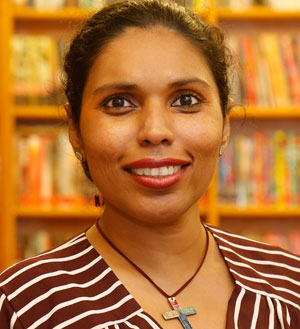‘Languages may be different but literature is literature’

Priyangwada Perera. Pic by M.A. Pushpa Kumara
Priyangwada Perera we meet at the Sarasavi bookshop in Maharagama, surrounded by words which is her element. This year’s winner of the H. A. I. Goonetileke Prize for Translation (a.k.a. the ‘HAIG’), Priyangwada has been a literature teacher, journalist, and is now Executive Editor – English at Sarasavi Publications where she is paid to read – her favourite activity.
After the excitement of the Gratiaen awards ceremony on Saturday at Cinnamon Life, Priyangwada is back in her groove, and can talk detachedly about translating a book that clearly required ‘linguistic acrobatics’ as the three judges of the HAIG this year – Krishantha Fedricks, Shash Trevett and Dileepa Abeysekera –unstintingly mentioned in their citation.
For Lamuthu Amaya, the original text of Wid Keirdo, comes from the world of modern Sinhala fiction – a realm that has evolved into a sophistication unsurpassed (as former Gratiaen winner Madhubashini Ratnayake once said our good Sinhala literati are ‘light years’ ahead of our English writers) with much spice and verve.
Lamuthu Amaya by the bestselling author Surath de Mel is narrated by an introverted child and is a delightfully funny yet revealing literary oeuvre. Given the wordplay and the puns used, all the colloquialisms of modern Sinhala so cutting-edge cool but near-impossible to translate, Priyangwada’s handiwork seems Promethean.
Yet this ‘convent girl’ is so easy-going and full of joie de vivre, full of quips. Brought up in Gampaha and having schooled at Holy Cross College, Gampaha, she read English at the Delhi University and taught at her school for five years. She also worked as a feature writer for the Ceylon Today.
Wid Keirdo may be her most recognised work but she has translated no less than 22 children’s books of Sybil Wettasinghe and also a two dozen or so fairy tales, retold. Each had their own challenge seeing as Sybil’s language is lyrical and has subtle interplay with the illustrations.
Priyangwada studied Sinhala literature as well at school and this stood her in good stead. Being exposed to new languages is important as they teach us new worldviews, she points out. Also it helps break down the insular view that “our language is superior”.
Priyangwada is stalwartly against the segregating of literatures by language, for she says “literature is literature. There are differences in language but ultimately we are talking about the same things – emotions, incidents, people, characters, so this is what we remain true to – whatever the language we use…”
That said there were times when she was stumped translating Lamuthu Amaya, admits Priyangwada with laughter. Some phrases were obdurately untranslatable. Surath de Mel had gone to town with the old Sinhala phrase appa kala de putha nokaloth u nottige putha turning it into appa kala de putha nokaloth u not uge putha and this Priyangwada could not convey in English.
The primary matter of Wid Keirdo, says Priyangwada is education and how institutionalized education fails to meet the needs of children who are after all ‘a different set of beings’. The weird kid of the title is an imaginative, introverted boy who is misunderstood and overlooked.
Surath de Mel, the author of the original, said that often in translation certain things are lost but he is happy that Priyangwada rendered his work into English without ‘killing the style and the humour’.
Searching for an ideal partner? Find your soul mate on Hitad.lk, Sri Lanka's favourite marriage proposals page. With Hitad.lk matrimonial advertisements you have access to thousands of ads from potential suitors who are looking for someone just like you.


